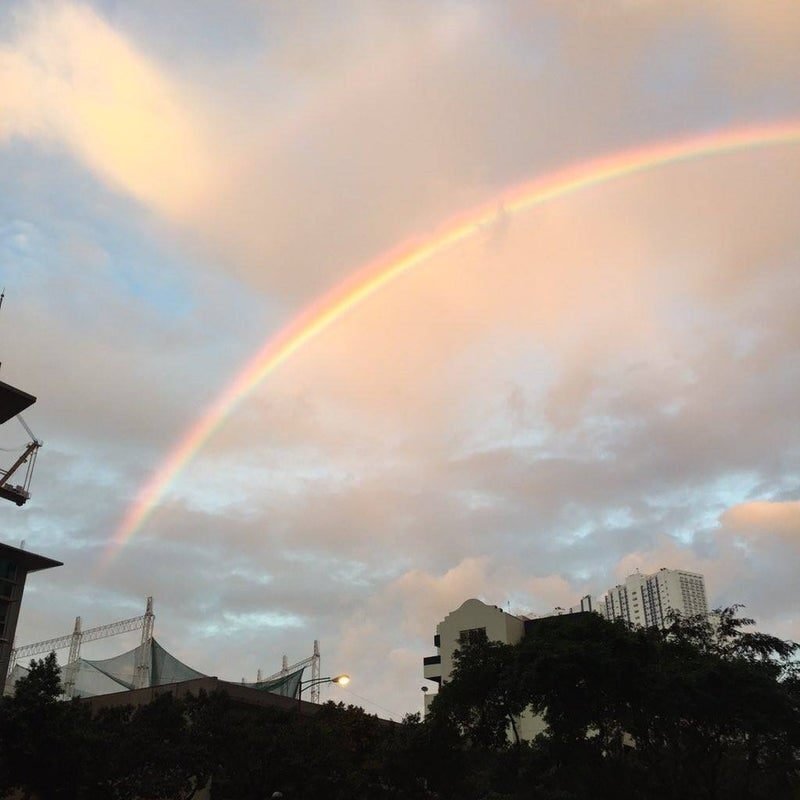
YM’s episode –expand online learning to Southeast Asia 東南アジアにオンライン学習を広げたい!-
Today I'm happy to announce the first working-abroad episode – of YM-san, who is working at the human capital venture especially for information service industry.
さて今回は海外勤務体験談ということで、現在、大手情報サービス会社で勤務されているYMさんに語っていただきます!
(これまでの体験記はこちら!)
以下、対談形式になります。(H:hiro、Y:YM)
1. 海外勤務のキッカケ ~オンライン教育を海外にも!~
(H)まずはじめに、海外勤務された期間、場所を教えてください。
(Y)インドネシアのジャカルタに2014年9月~2015年12月、そしてフィリピンのマニラに2016年1月~9月、勤務していました。
いわゆる駐在という形ではなく、月の半分を現地で過ごし、残り半分を別の国もしくは日本で過ごす、といった生活でした。
(H)Firstly, how long and where did you stay?
(Y)I worked in Jakarta, Indonesia from Sep 2014 to Dec 2015, and Manila, Philippines from Jan to Sep in 2016. I spent half of the time in these countries and the rest in either Japan or neighboring countries.

(H)海外勤務のキッカケは何だったのでしょうか?
(Y) 大手情報サービス会社に勤めていたのですが、日本で展開しているオンライン教育サービスを海外でも展開したいというプロジェクトがありました。
2014年の始め頃から色々調査をしていて、海外案件を担当していた先輩とやり取りをする中で、2014年の夏に現地で働いてみないかと声が掛かりました。
(H)What brought you there?
(Y)I worked at a human capital venture, and the company wanted to expand online education service to global. I conducted some research since the beginning of 2014, and helped colleagues working in Indonesia, and he asked me to join the global project.
2. 準備期間 ~ビジネス英語は日常会話よりむしろ楽!?~
(H)海外勤務に当たって、英語はどのように勉強されましたか?
(Y)大学時代に海外旅行の経験が多少あったので、外国の人と話すことへの抵抗感はあまりありませんでした。2014年の4月から半年程度、土曜日に2時間、英会話スクールでレッスンを受けていました。ネイティブ講師との英会話に加えて、宿題としてBBCニュースのシャドーウィング・ディクテーションやライティングの課題など、4技能を鍛えるトレーニングに取り組んでいました。
ただ、実際に現地に行ってみて感じたのですが、個人的には、英語の準備ってそこまで必要ないのではないかと思っています。高校卒業レベルの最低限の読み書きさえできれば、ビジネス英語では仕事のコンテクストから展開・論点などがある程度想像できるので、いわゆる日常英会話よりむしろ楽なんじゃないかなと。
(H)How did you strengthen your English ability?
(Y)I’m very fond of having a conversation in English partly because I traveled some countries during my undergrad days. From April 2014 on, I received a private English lesson, including shadowing BBC news and writing essay, for two hours every Saturday for six months. Personally I believe that we don’t have to prepare for English that much. Business English is actually easier than daily English conversation as we can anticipate what points would be touched upon during the conversation.
(H)確かに僕も授業中の会話より日常会話の方が断然苦労しています。どんな話題が飛んでくるのか分からないもんね(笑)
(Y)そうなんです!現地に入ってからは、仕事で使う英語表現・単語以外の、アカデミックな表現のトレーニングとして、Newsweekのポッドキャストなどを使っていました。
(H)I also have more difficulty catching up with daily conversations than academic discourse. We cannot anticipate what topic comes next!
(Y)Exactly! And after starting to stay in Indonesia, I learned some academic expressions by using Newsweek podcast.
3. 東南アジアでのミッション ~マーケット調査、カリキュラムへの準拠など~
(H)簡単に当時の仕事内容を教えてもらえますか?
(Y)日本で成功していたオンライン教育サービスを、インドネシア及びフィリピンに展開するというのが事業の内容でした。
部署として初めての海外進出だったため、オフィスを作ることから始まり、最初の2~3ヶ月は人探し(提携する会社、授業を担ってくれる先生)や現地の予備校マーケット調査、それからコンテンツ作りやマーケットの戦略を練ったりしていました。
(H)Please elaborate on what kind of job you were engaged in specifically.
(Y)Our mission was to disseminate online education service successful in Japan to Indonesia and Philippines. Starting with establishing an office (because we had no similar service before), we created a connection with partners and teachers, investigated domestic market about cram schools, and devised contents and marketing strategies.
(H)学校を通じてconsumerに届けるんですか?
(Y)いや、家庭にダイレクトに届けています。
そのため、これらの国でも普及してきているFacebookやinstagramに広告を出稿したりするのも重要な打ち手でした。ちょうどこの時期に、ロンドンベースの教育系スタートアップ企業を買収することになり、その会社の方々とも連携して事業を進めていきました。
(H)Did you use schools as a channel?
(Y)No, we provided this service directly to each household. Placing advertisements on Facebook or Instagram which started to prevail in these countries were also critical. During my stay, The company I worked at acquired a London-based edtech startup venture, so I also proceeded these missions under cooperation with them.
(H)日本のサービスを他国に広めるに当たって、相違点や留意したことなどはありましたか?
(Y)インドネシアは学年分けが6-3-3制で、センター試験と同じような試験があり、日本と基本的なシステムは似ていたので障壁はそこまで少なかったですね。
ただ、物理的な面で言えば、交通渋滞が尋常じゃなくて、学校が終わって塾に着いたら授業が終わってることもザラにあるのには驚きました。
(H)Is there any difference between Japan and these countries that you kept in mind when providing this service?
(Y)Indonesia has similar school system, composed of 6-3-3 years and also matriculation test, so there was not so many hurdles. Aside from that, traffic congestion was terrible, with some students heading to cram schools after school but only to find lessons were over.
(H)えーっ!?それはひどいですね。。
(Y)これを経験しちゃうと、日本の渋滞は渋滞じゃなく感じますよ(笑)あと、スコールが降ると電車が走らなくなったりします。
(H)Oh my gosh! That’s disastrous…
(Y)Now I don’t care at all about traffic congestions in Japan. In addition, trains might be ceased in the presence of sudden shower.
(H)フィリピンはどうでしたか?
(Y) 元々、10th Gradeの次がもう大学進学になっていて学年分けが日本と異なることや、大学受験マーケット自体もそこまで成熟しておらず、学校の日々の授業のサポートツールとして参入することが重要で、学校カリキュラムにいかに準拠させるかを工夫しました。
(H)How about Philippines?
(Y)It was quite difference since students are supposed to go to college after 10th grade, and the market was not mature. Therefore, we had to adjust our product to schools as a support for daily life (e.g. by tailoring the contents to textbooks used in schools).
(H)「とある一日」のスケジュールを教えてください。
(H)Please share your daily schedule in Indonesia1
(Y)インドネシアですが、以下のような感じです。
8:00 起床・朝食 Waking up and having breakfast
8:30 出社 Starting to work
10:00 ミーティング(1日のタスクの確認) Meeting (check daily tasks)
11:00 個人作業 (Individual work)
12:00 昼食(ショッピングモールか、大戸屋のデリバリー) Lunch (at shopping mall or delivery from Otoya)
13:00 1時間くらいかけてタクシーで移動 In a taxi
14:00 クライアントとのミーティング(例えば出版社の方とテキストの直近の進捗の確認、スケジュール感の調整など) Meeting with clients (e.g. textbook companies about follow-up of the content of textbook, coordination of schedules)
16:00 ミーティング終了 → タクシーで移動(帰りは渋滞がひどく、行きの2倍かかる) Done with meeting and going back to office by taxi (basically takes twice as much time as in the early afternoon)
18:00 ミーティング、個人ワーク Meeting and individual work
20:00 退社 Leaving office
21:00 夕食 Having dinner
22:00 ジムへ Going to gym
23:00 帰宅 Going back home
4. 感じたギャップ ~「空気を読む」は通用しない!~
(H)海外勤務前と後でのギャップ(驚いたことなど)はありますか?
(Y)生活面で言えば、上で述べたようにインフラ整備が進んでいないことです。インドネシアはアジアの途上国の中では進んでる方ではあるのですが、先ほど申し上げたような交通渋滞はほんとうに酷く、交通網の整備は課題が大きいと感じています。
衛生面でも注意しなければいけないことは多くて、スタバでアイスコーヒーを頼んだら氷であたったこともしばしばでした(笑)
(H)What surprised you during your stay in these countries?
(Y)As for daily life, the insufficient infrastructure annoyed me a lot. Some Japanese might think Indonesia is more developed than many Asian countries, but I feel that the maintenance of the transportation network is problematic as I said about the traffic before. Also, I often had a stomachache after drinking ice coffee in Starbucks!
(H)それはやばいね(笑)
(Y)仕事面で言うと、思っていることを直接言うことが求められるため、日本でよくある「空気を読む」というのは通用しないと感じました。
たとえばですが、「~までにやっておいて」と言う場合、それまでに始めるのか?終わらせるのか?中間成果物を作るのか?をspecifyしないと双方の認識が食い違ってしまう、というようなイメージです。
(Y)Haha, that's kind of funny.
(M) With respect to job, I was supposed to express my opinion directly, so Japanese custom of reading between the lines doesn't work there. For example, imagine you say “please do that by …”. In this case you have to specify whether this “do” means starting, ending or making some intermediary product. Otherwise we will not be on the same page.
(H)一言一言に気をつかわないといけないんですね!
(Y)はい、日本人がついつい阿吽の呼吸でやっていることを、明示的に相手に伝えないといけなかったですね。これはとても勉強になりました。
また、意思決定を自分がしなきゃいけないケースも増えたと感じています。
(H)You have to be very mindful when choosing words!
(Y)Yes, I had to convey my message clearly and explicitly, but this experience was quite meaningful to me. I also had an impression of undertaking more decision-making responsibility than in Japan.
5. オフィスや生活 ~現地の人に考えてもらう、ラマダンから銃撃戦まで~
(H)オフィスの日本人割合はどんな感じだったんですか?
(Y)日本人が3~4人、インドネシア人が3~40人ですかね。
元々日本で展開していた教育サービスのノウハウは日本人しかはじめ持っていないのですが、それをLocal contextに当てはめるにあたっては、自分たちの仕事のやり方を押しつけるのではなく、現地の人たちが自分で考えてもらったほうが良いというスタンスで仕事に臨み、日本人がいなくなっても現地スタッフだけで回せるような組織を作るというのを最終的なゴールにしていました。
(H)How many in your office were Japanese?
(Y) 3 to 4 Japanese people and thirty to forty Indonesians. We Japanese staffs are of course more familiar with the details of the online education service we are providing in Japan, but our concept here is to let indigenous local people think themselves and their own culture rather than imposing ours. Our ultimate goal is to create a sustainable organization in which Indonesian people, without any Japanese, will be able to take charge of these operations.
(H)なるほど!確かに全ての国にずっと日本人が常駐できる訳じゃないですもんね。次に、海外勤務中に苦労したこととか、印象に残っているエピソードはありますか?
(Y)生活面ではやはり日本食が恋しかったです。一風堂、ココイチなど日本食のお店が普及してきたのはありがたかったですね。
また、宗教の影響の根強さを肌で実感しました。12時と夕方にはお祈りの時間があり、オフィス内にあるPraying roomに現地の方は皆行ってお祈りをするんです。あと、ラマダーン(6月中旬~7月中旬)期間になると、昼はご飯を食べないので、皆元気がなく、文字通りその1ヶ月は予想通りに仕事が進みません。
日本の上司に「ラマダーンなので仕事が全然進まないんですよ」と言ったんですが、あまり理解してもらえませんでした(笑)
(H)Well said! Makes sense because you cannot delegate staff to all countries. How about your struggles or lingering memories while working abroad?
(Y)I missed Japanese cuisine so much, but fortunately there are some Japanese shops as Ippudo and Koko-Ichi. Another things is how religion affected people's daily lives. Basically all Indonesian staff went to the praying room at noon and in the evening. Moreover, during the Ramadan, Indonesian people are lacking energy as they don't eat lunch, which prevented our project from moving forward. When I called my boss in Japan saying that I could not finish the project until when it was supposed to because of the Ramadan, he did not understand me.
(H)確かに僕も自分の目で見なければ理解しがたいかも・・・。あとはやはり渋滞ですか?
(Y)これは本当に筆舌に尽くしがたいです。どれくらいかっていうと、タクシーに3時間とか乗っているので、途中でトイレに行こうと思ってお金を払って降りるんですね。それで、トイレに行って戻ってきてもまた同じ車に乗れます。進んでないから(笑)
(H)I can understand his feeling… Anything else?
(Y)Traffic congestion is beyond description. Suppose I get off a taxi to go to a restroom. After finishing I can still get on the same taxi because it did not move forward.
(H)そ、それは日本の渋滞がかわいく見えそう・・・
(Y)あとは気候が年中暑いのも日本とは違いますね。冬に日本と行き来するときは、2種類の服装を用意する必要があります。
治安面で言えば、自爆テロで近くのスタバが爆破されたことがありました。テロがあったときにオフィスで仕事していた近くで銃撃戦もありました。
フィリピンではテロはありませんでしたが、夜に「money!money!」とナイフを出しながら言われて、お金払ったら帰ってくれたことがありました。(H)やはり、日本とは全然違いますね・・・そういう時は逆らわないのが一番ですよね。
(H)Sound like the one in Japan isn’t serious at all.
(Y)And the weather is constantly hot throughout the year, so when I went back and forth between Japan and Indonesia I had to prepare two types of outfits. As for safety, the Starbuck that I frequently used was destroyed by a terror attack. I even could see the gunfight as I was in the office when it took place. In Philippines, I didn’t experience any terror attack, but I was robbed of my money by somebody approaching me with a knife.
(H)Quite different from Japan. Had better not resist when encountering.
6. 将来の展望 ~国ごとに最適な教育サービスを~
(H)今後、海外でまた働いてみたいとか、将来の展望があったら教えてください。
(Y)次は、欧米諸国で働いてみたいと思っています。色々な国の異なる教育事情を学んで、その国ごとにあった最適な教育サービスを提供できる人間になりたいです。
個人的には、程度の差こそあれ学歴社会は世界中のいたるところに存在していて、一定以上のラベリング機能を果たしていることは否定できない事実なので、社会的・経済的背景にかかわらずどんな子供も良質な教育・学習にアクセスできる環境を作っていきたいです。
(H)Please share your future career plans!
(Y)I would like to work in Western countries in the next. I wanna learn different situations in education and tailor the best educational service to each country. In my view, meritocracy is still prevalent more or less in any country and functioning as a screening device, so my goal is to create an environment where every child, regardless of social and financial background, have equal access to quality education and learning.
7. 海外勤務希望者へのメッセージ ~英語があまり話せなくても、準備すれば海外勤務はできる~
(H)最後に、海外勤務を考えている方へのメッセージをお願いします!
(Y)まずお伝えしたいのは、日本人の英語力は結構大丈夫だ!ということです。日本の中学卒業程度の英語力があれば、海外に行ってしまえば後は色々やりくりしながら解決できるレベルだと思っています。
日本の英語教育は「話せない」「役に立たない」と批判を受けることもありますけど、機能している側面もちゃんとあると思います。
(H)Lastly, let us know your message to those who are considering working abroad!
(Y)The single most important thing is, “Trust your own English ability!” Once you go abroad, you can adjust to the life there somehow including language. I know that English education in Japan is criticized by many people, for example “cannot speak”, “Not useful”, etc, but still I believe contributing to my proficiency to some extent.
(H)日本人は完璧な発音を気にしすぎて、色んなハンディキャップを負っているという例は結構色んな所で目にしますね。
(Y)本当のネイティブ英語を話せる人って、実はそこまでいないと思うんですよ。そういう意味でも、これから海外勤務にチャレンジされたいという方には、東南アジアはオススメだと思います。
たとえばフィリピンはタガログ語、インドネシアはインドネシア語が第一言語で、あくまで仕事で用いる第二言語として英語を新たに勉強して使っていますが、日本人が、母語は日本語だけど仕事で使うために英語を新たに勉強するのと同じですよね。
英語という言語への考え方が近いですし、ちょっと間違った英語で話していても、変な顔をせずに理解しようとしてくれるので、「話すこと」「意見を述べること」への心理的障壁が低い状態で、日々を過ごしやすいと思います。
(H)I heard from many people that Japanese people care too much about pronunciation and feel unnecessary handicaps.
(Y) I don’t think people who can speak true native English actually are not so there. In that sense, I think that Southeast Asia is recommended for those who want to challenge overseas for the future. For example, in Philippines Tagalog language, Indonesian language Indonesian language is the primary language, they are newly studying and using English as a second language to be used at work. Our mother tongue is Japanese but we are studying English to use at work, which is the same situation as Indonesia and Philippines. The idea for the language of English is close, and even if I speak in a mistaken English a bit, they try to understand without funny faces, which causes my psychological barriers to "speaking" and "expressing my opinion" to lessen. It is easy to spend the days in a low stress for using English.
(H)読み書きはそれほど困らないですもんね。
(Y)そうですね。仕事であれば、会議で何を話すかは自分で事前にインプットできますし、分からない単語も調べられるので。「英語があまり話せなくても、準備すれば海外勤務はできる。」と思っています。
チャンスがあれば手を挙げてみることが重要です。
(H)I don’t have so much difficulty in reading and writing.
(Y)In business situation, you can input beforehand what you talk at the meeting and you can also look up words you do not understand. "Even if you cannot speak much English, you can work overseas if prepared." If you have chance, just cling to it!
YMさん、お仕事忙しい中インタビューに答えてくれてありがとうございました!
次回はまた海外勤務をされている方からのエピソードを紹介したいと思いますので、乞うご期待ください!
Thank you YM-san for sharing your episode! Next time I’ll introduce an episode of working abroad, so stay tuned!!
(※本記事は、2017年6月時点のものをリメイクしたものです。)
この記事が気に入ったらサポートをしてみませんか?
